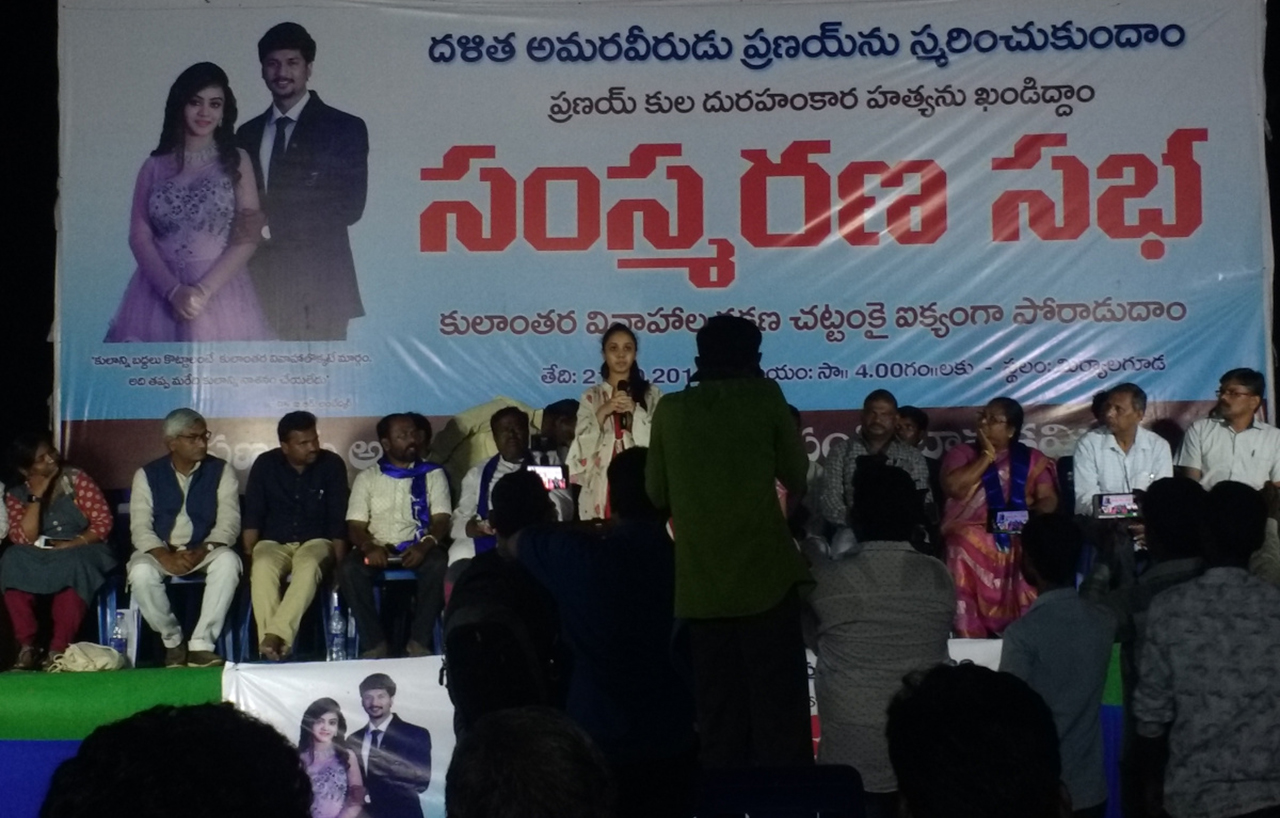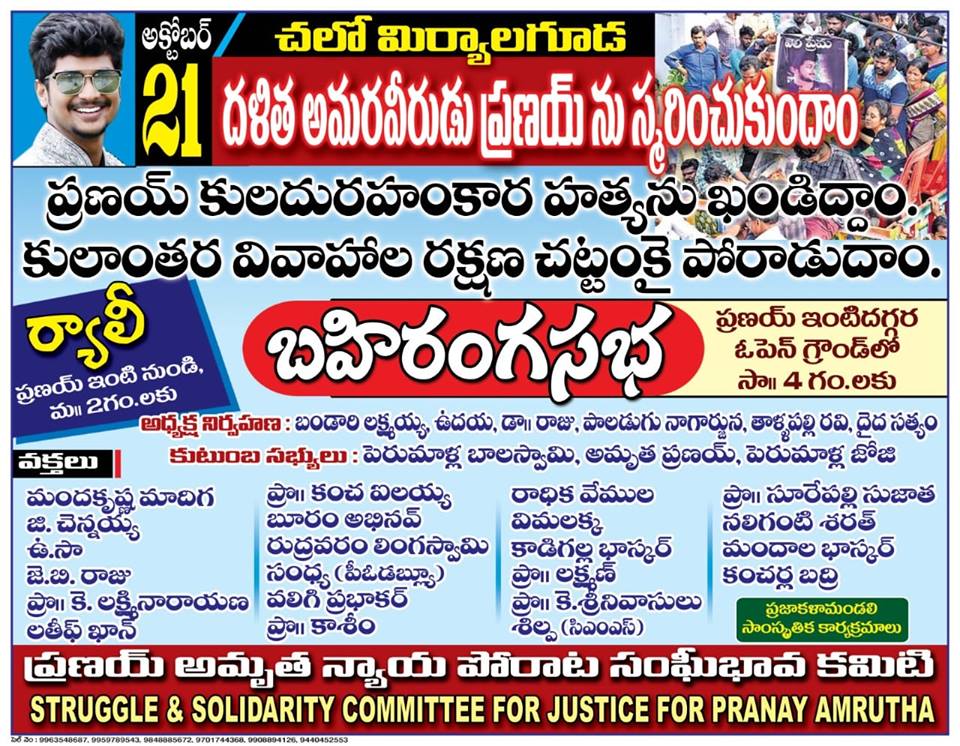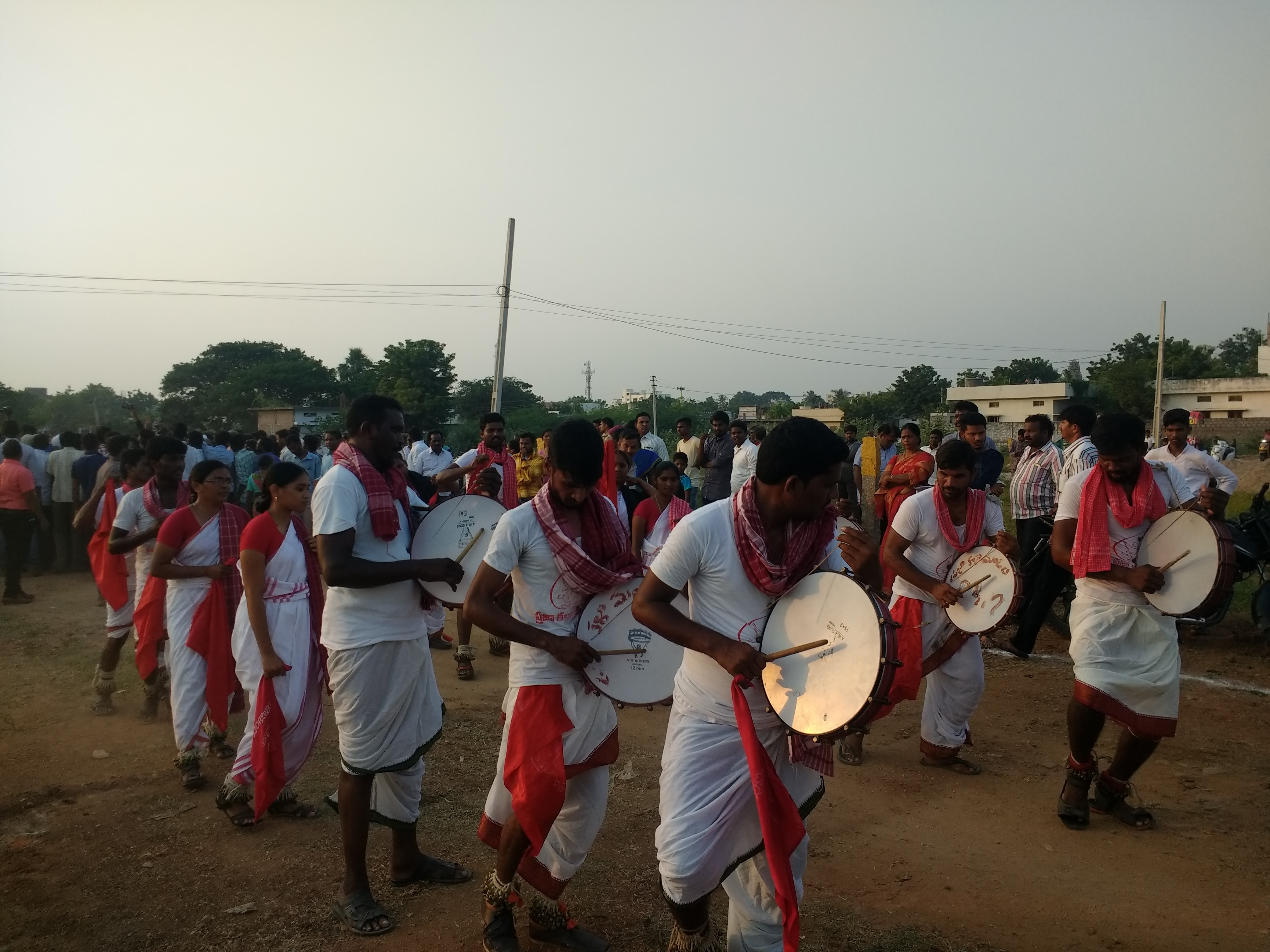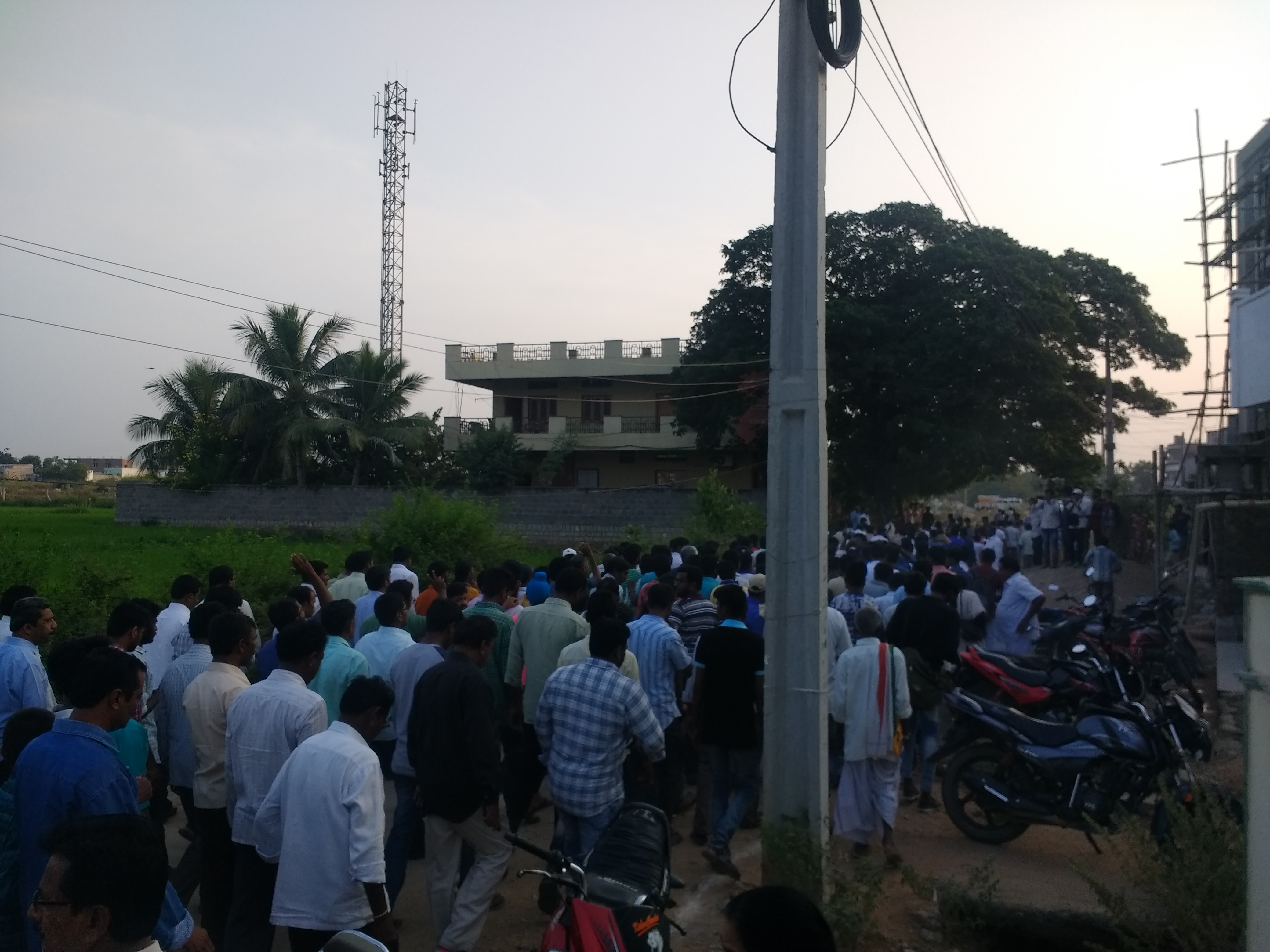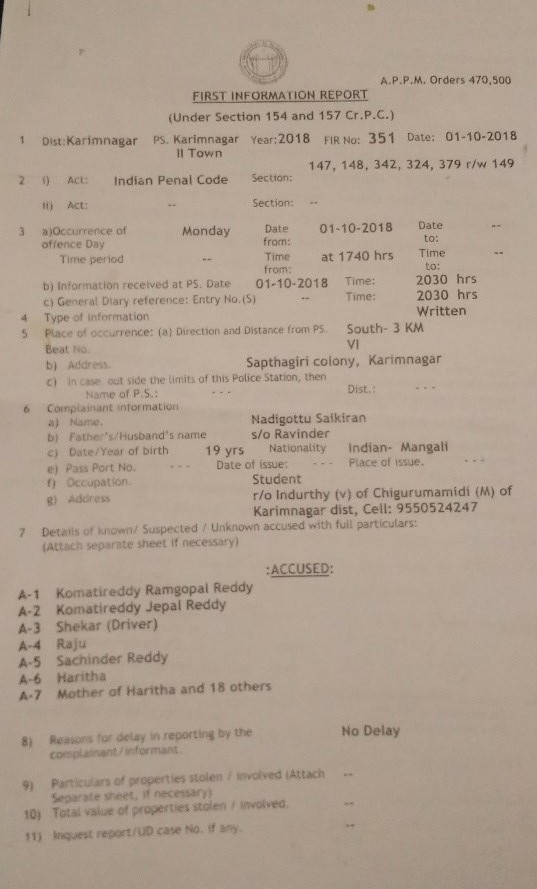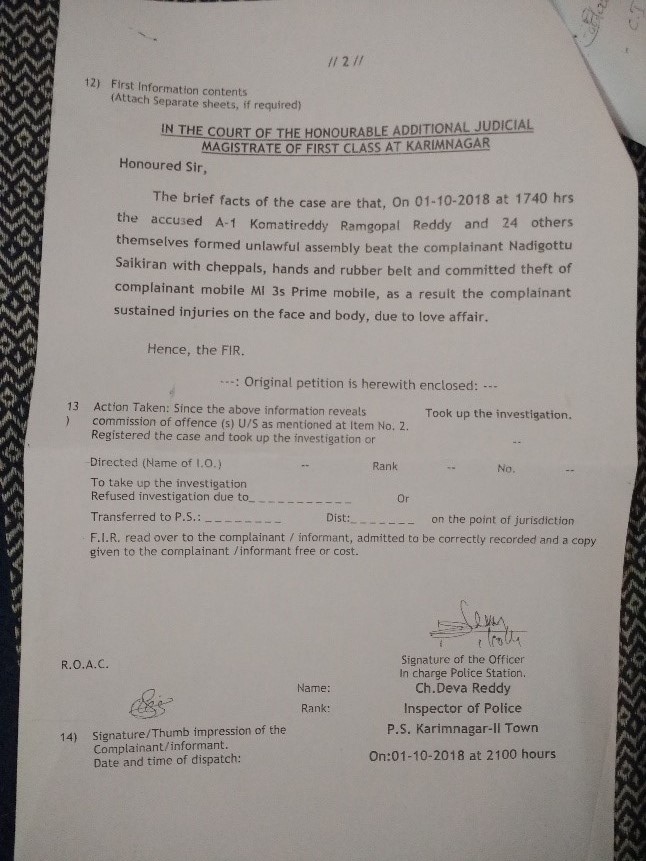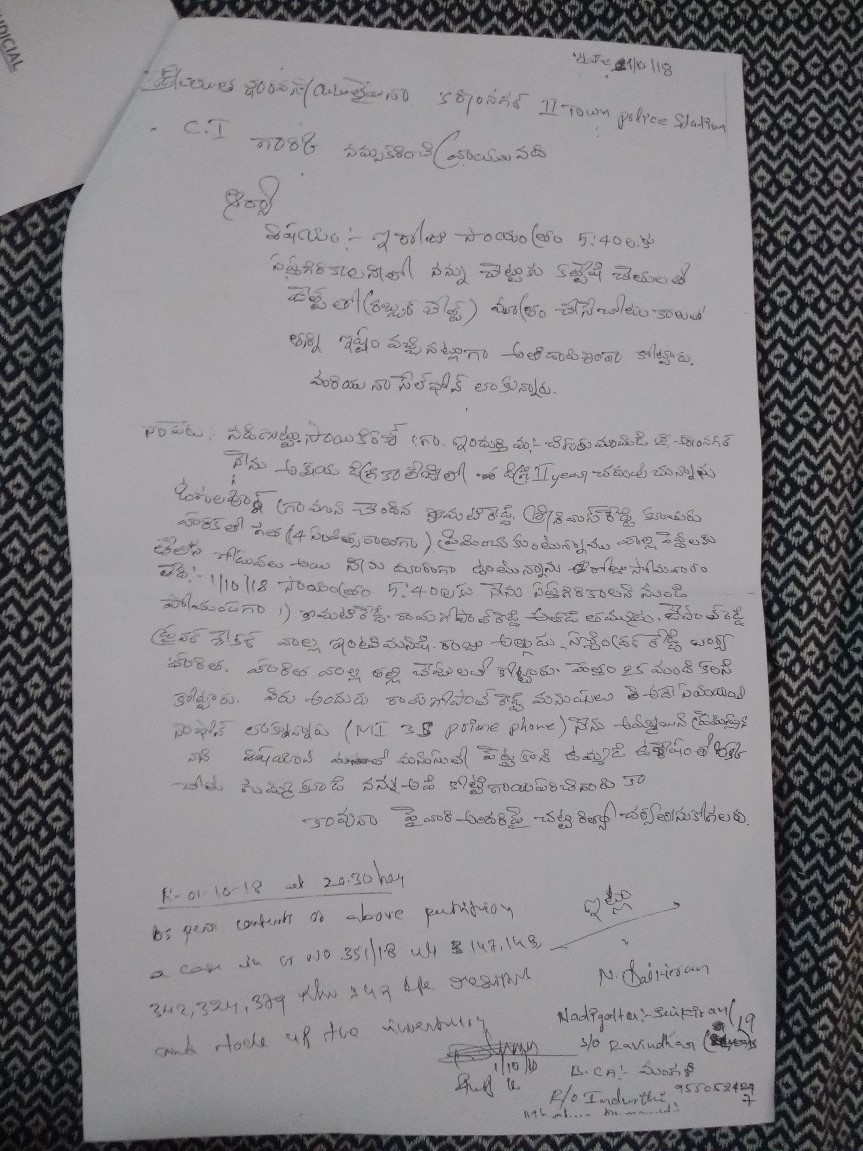Within the last month and half there have been a series of caste killings in Telangana – often narrated as “honour killings” – murders of young dalit and OBC men for marrying in defiance of caste hierarchies. While the ruling party maintains a stoic silence with upcoming Assembly elections, people are coming together to protest. A GroundXero report.
There has been an upward swing in murders of young Dalit and OBC men in Telangana these past two years, for marrying women higher up in the caste hierarchy. Within the last month itself there have been a number of incidents in different districts. Amongst these, the murder of Pranay (from the Mala community) for marrying Amrutha (from a Vaishya family), has been relatively widely reported on. At Pranay’s place in Mriyalguda, Nalgonda district, over 40 organisations and almost 1000 individuals gathered in protest on 21st October, and spoke loudly of love across caste barriers. Along with those visiting, the bereaved family members also joined in, at times sitting quietly amidst the din of photos and chants for the recently deceased, occasionally looking away to wipe a tear.
A fact-finding team of the Civil Liberties Monitoring Committee, comprising Lateef Mohammed Khan, Aishala Srinivas and Nikhat Fatima visited Miryalguda earlier this month. It is worth quoting from their report at length:
“On 14th of September, Friday, Pranay (23), his wife Amrutha (21) and Pranay’s mother Premalatha had gone to a maternity hospital for a check-up as Amrutha is pregnant. As they were walking out of the hospital an unknown assailant came up from behind and hacked Pranay to death striking two fatal blows on each side of his neck. Pranay died on the spot, while Amrutha fell down unconscious. The unknown assailant was caught on the camera but escaped from the spot.
“… Balaswamy [Pranay’s father] told us that the children were ‘good friends’ right from their school days. Amrutha was his junior by 2 years. And later when they were pursuing their higher studies in Hyderabad they decided to marry …
“Amrutha’s father, Maruthi Rao, a real estate developer and owner of several properties was against his only daughter’s affair and kept her confined in the house for nearly 6 months. … But they got married in an Arya Samaj mandir in Hyderabad in the month of January 2018. Pranay’s parents relented and helped the couple settle by renting out a villa for them in Hyderabad and furnishing it. …
“The plan for Murder:
“According to local sources Maruthi Rao personally knew Mohammed Bari, who resided in Nalgonda … around 60 kilometres from Miryalaguda. … When Maruti told him of the plan to bump off Pranay, Bari contacted his friends … and a deal was struck for Rs.1 crore, as per the police.
“The others arrested in the case are Subash Sharma, who was with Bari in prison and is the person who hacked Pranay; Asghar Ali, who was one of the accused in the murder of Hiren Pandya, former Home Minister of Gujrat; Abdul Kareem, a transport operator and also a friend of Maruti Rao; Sravan, a relative of Maruti; and Shiva, Maruti’s driver. And of course Maruti Rao himself, who is the main accused in the case. One month before killing Pranay, the contract killer was brought from Bihar to Miryalguda, and familiarized with the town. Balaswamy, Pranay’s father said, “It is a planned murder and the killer was such an expert he did his job swiftly and fled from the scene.”
“He also said that he has seen the FIR and the sections under which the 7 accused are booked under 302 (Murder), 34 (Acts done by several persons in furtherance of common intention), 120b (Party to a criminal conspiracy) read with 109 (Abetment) of the Indian Penal Code (IPC), and Section 3(2)(v) of the Scheduled Caste and Scheduled Tribe (Prevention of Atrocities) Act, 1989.”
The Kula Nirmulana Porata Samiti (Struggle Committee for Annihilation of Caste) took a proactive role, as part of the “Struggle and Solidarity Committee for Justice for Pranay Amrutha”, and organised the protest in Miryalguda on the 21st. Speaking to GX, B Laxmaiah, State President of KNPS, said that the initial plan was for the previous weekend, but the police did not give permission, so it had to be rescheduled. They also did not give permission for the meeting to be held in the grounds near the town centre, but only in a plot of land adjacent to the primarily dalit locality where Pranay lived. That too, permission was granted only the evening before the event, making a larger mobilisation difficult. It was further stipulated that any rally could not go via main roads, but had to stay confined to bylanes. Later, after the rally and while inaugurating the public meeting, B Laxmaiah spoke of the need to support Amrutha, and Pranay’s family, in these difficult times, and called for a fast track court to ensure that justice is delivered. These calls were echoed by various speakers, as the meeting went on for approximately 4 hours, till about 10pm.
Amrutha spoke about the importance of enacting a Pranay Inter-Caste Couple Protection Act, as current legislation does not make explicit provisions for supporting both the partners in such a marriage. This would also act as an explicit encouragement for breaking caste barriers through marriage. She further spoke about the demand for Pranay’s statue being built, and said that the point wasn’t to simply commemorate him, but to mark a protest through doing so. Whether the accused be her relatives or not, she said, she wants justice to be done, and thanked everyone for the support.
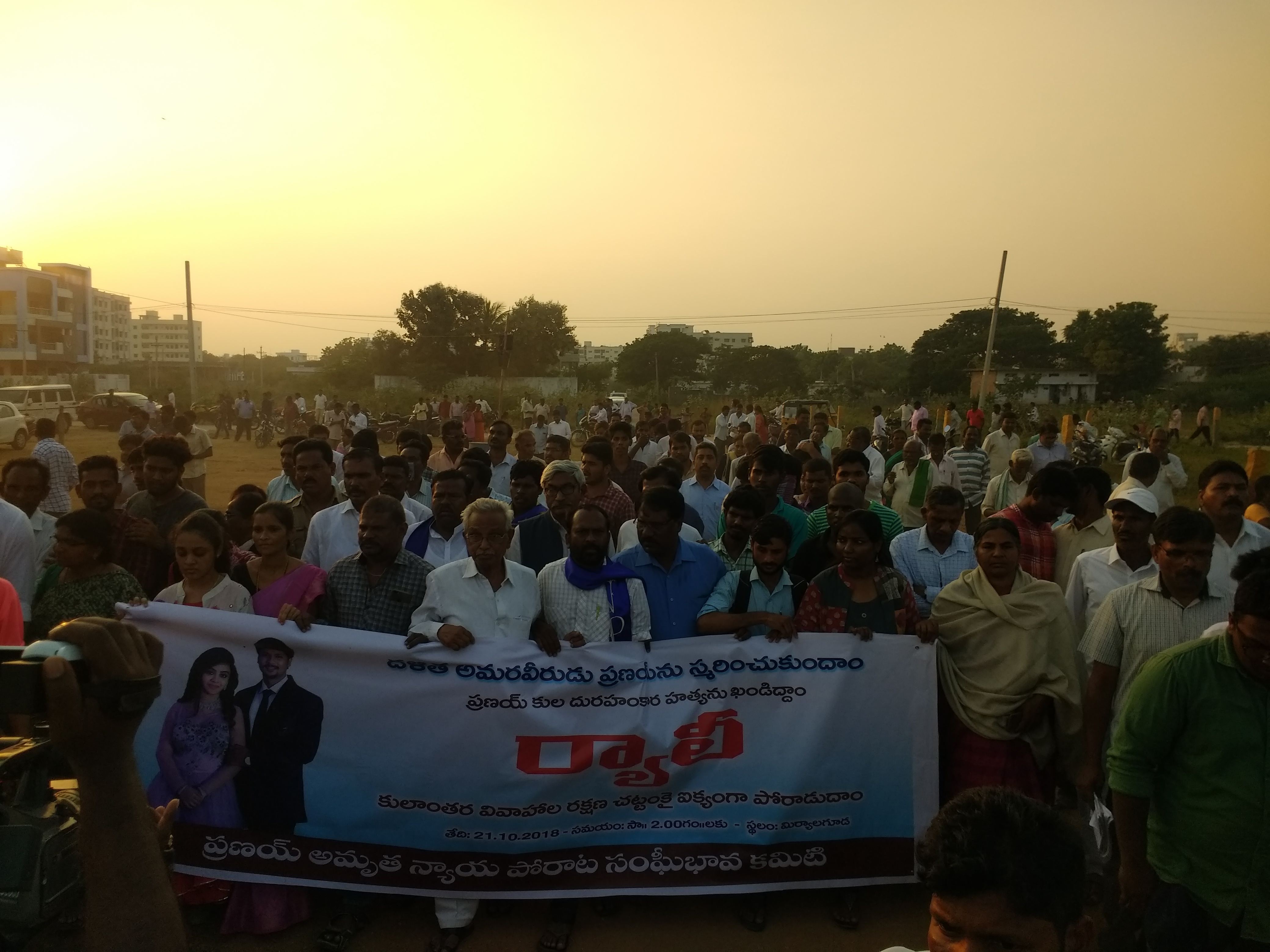
A section of the rally, with Amrutha and Pranay’s parents holding the banner on the left, and Radhika Vemula holding the banner on the right
State President of Kula Vivaksha Porata Samiti (Struggle Committee for Fighting Caste), CPI-M’s anti-caste front, Kadigallu Bhaskar, spoke of attempts by Hindutva groups to confound the issue. For instance a group of Hindu Dalits have started claiming that this was not directed at Pranay due to his dalit identity, but due to his being a Christian – thereby hoping to divide the protests. Professor Kasim, poet and member of the Revolutionary Writers Association (VIRASAM), said that this murder was primarily about caste, but also about class. He spoke of his experience as a Madiga man marrying a woman from a Reddy family, but not facing similar circumstances because he was a professor. Activist Sujatha Surepalli of the Bahujan Pratighatana Vedika argued in response that this was not about class, since Pranay, though young and not yet independently financially stable, belonged to a middle-class family, and that this was simply about caste.
Speaking to GX, U Sambasiva Rao (Usaa) of the Bahujan Pratighatana Vedika asserted the importance of narrating this bluntly as it is – as a caste killing. He said Pranay’s father told him that Maruthi Rao, Amrutha’s father had called him and said – I can marry my daughter to a poor guy, a person with disabilities, but not a dalit boy. Usaa is also the Chairman of a newly formed Inter Caste Marriages Protection Forum. In conversation with GX, when asked about the relative publicity of Pranay’s murder as opposed to the ones that followed, Satish Kumar, Hyderabad committee President of KNPS argued that there were two reasons. Firstly, his very public murder marked a new brazenness in such caste killings, and has provided a script in different ways for the subsequent murders. For instance, the wide circulation of the CCTV video of the murder in Miryalguda is mirrored in the attack by Manohar Chari in Hyderabad just five days later. Secondly, given that Pranay is from a middle-class family, as opposed to others murdered from relatively poorer families, this has become an instance of a ‘pure’ caste killing – uncomplicated by class, as it were – and has allowed for it to become a kind of rallying point for dalit forces. He said KNPS teams have been there since day one, to provide support to the family and vitally to Amrutha, and have been doing so in the other cases as well. KNPS pamphlets also stated that Maruthi Rao has a history of other crimes – from land-grabs to illegal businesses – aside from the alleged murder of Pranay – and highlighted the charges against him (unrelated to Pranay’s murder and the Atrocities Act) for which he is under arrest (in accordance with the Preventive Detention Act). Tragically, Pranay’s grandfather is said to have helped Maruthi Rao set up his business in the region when he first arrived there.
Usaa spoke to GX of another caste killing in Keshavpatnam since Pranay’s murder. Usaa was part of a fact-finding team that visited, and what follows in this and the subsequent paragraph is his narrative paraphrased. Gaddi Kumar, who belongs to a Yadav family, fell in love with a woman from the toddy taper community (Gouda). Both are from Backward castes, and hail from Keshavpatnam, a small village in Karimnagar. She was a minor. A khap panchayat was held in the village, and it was agreed in compromise by parents on both sides that once she turns 18 in another fortnight, they would be married off. But a maternal uncle of the girl, who has ties to the RSS/BJP, was not happy with this plan. Taking advantage of the 15 day grace period, the girl’s family abducted (or planned for the abduction of) the guy, and he was taken to a cotton field on the outskirts of the village. After the abduction, they called the girl and said they’d kill him, so she alerted the guy’s parents, who rushed to the police station to register a “missing person” report, but they were turned back. That night he was killed. Next morning the parents again went to the police station, but the police held them by their cuffs and pushed them out, still refusing to file a missing person report. In other words, whether through their actions or inaction, the police is also complicit in this murder!
After a while the stench of the body along the highway led to its detection by local people, who blockaded the highway for a couple of hours, along with the body. When SI Satyanarayana came to the spot, local people held him complicit for not filing the reports earlier, and they surrounded him. Then the CI arrived and the SI was taken away from the spot, but despite the CI’s assurances the blockade continued, till revenue officers and others arrived and managed to persuade people with different assurances. Another aspect of this, Usaa continued, is that the Karimnagar CP, Kamla Hasan Reddy made misleading statements to divert attention from the police culpability: he said to the media that this was suicide, not murder, even before a post-mortem report was available; and then said that the boy was kidnapping and harassing the minor girl, an allegation that the girl publicly rejected in front of the media. Desi Disa, an activist Telugu media outlet, uploaded a video of the funeral march and burial.
- Copy of FIR filed for the attack on Sai Kiran
Sujatha Surepalli, speaking to GX, narrated another incident that occurred in Karimnagar, in early October – what follows in this paragraph and the next is her narrative and argument paraphrased. Sai Kiran, belonging to the barber community (Mangali caste), and Haritha Reddy, were in love and planned to elope. Alongside their caste hierarchy, economically the woman’s family was well-off as well, whereas the man’s wasn’t. Getting wind of their plans, he was kidnapped by the woman’s family, tied to a tree, and beaten brutally by over twenty people. The woman’s paternal uncle, who is also amongst the alleged perpetrators, is the district secretary of the Communist Party of India. Though activists approached the CPI state committee – and CPI is reportedly supporting the boy’s medical treatment, and has condemned the attack – they are yet to take any disciplinary action against their office bearer for his complicity, she said. The police officers are also from the same caste – Reddys – and all the accused managed to get out on bail since the non-bailable charge of “attempt to murder” was not filed against anyone. Sujatha went on to say that aside from these hardly publicized instances, there are also ones that even they as activists don’t get to know of – and she cited an instance of someone speaking up at an event held in support of Pranay and Amrutha at Osmania University, where an audience member narrated a murder that had occurred recently in Rangareddy district, which she hadn’t know of.
Sujatha argued further that it is vital to question the centrality of marriage as an institution in this process. It is to be noted that in all these cases the women are between 17-21 years old, in all these cases they were being pressurized by their family to marry against their choice, then in turn they were hatching plans to elope with these guys, who were also very young. At different points in the process, the women would also be kept confined to their house by their parents, so that they could not meet their lovers. If the family got wind of a plan to elope, they were likely to speed up marriage plans with some other guy and/or target the lover. If they only learnt after the elopement, they would still go after them, and there have been instances of people also killing their own daughter. Even just this past September, there was the much publicized attack by Manohar Chari in broad daylight in Hyderabad, where he very seriously injured his daughter, who spent about a month in hospital. The various stages of the families’ reactions are about containing the woman’s sexuality and agency: from placing them under house arrest, to seizing their phones, curtailing their ability to contact anyone, and then in case they elope there will be kidnapping charges against the guy. In these constrained circumstances, even if a woman is able to avoid a coerced marriage against someone else or confinement at home, by marrying someone she loves, it is still very difficult to survive – married so young before either partner has any financial stability, and without support from home. The incredibly difficult circumstances faced by women in these situations are often being elided, she said. While feminist organisations have been expressing their solidarity by attending protests and issuing statements, she argued that they should proactively take up these cases and organize with and in support of the women in inter-caste marriages.
With assembly elections around the corner in early December, and with a sizeable dalit voting block in the state (more broadly, it is reported that Backward Classes, Scheduled Castes, Scheduled Tribes and minorities constitute 85 percent of Telangana’s population), the ruling Telangana Rashtra Samiti and it’s upper caste leadership is trying it’s best to keep the lid on news of these atrocities. Some members of TRS have allegedly tried to pressurize families to withdraw their cases. Officially, they are keeping mum on these increasing murders. Someone joked, TRS is just one “S” short of being the Telangana RSS! Yet, despite the barriers erected by the ruling dispensation, a variety of organisations and people are coming together to protest, and stand in support with each other. Bhimrao Ambedkar spoke of the importance of inter-caste marriages as a part of the struggle to annihilate caste, and his words keep coming up as a refrain in the messages of love – in defiance of caste barriers – that are emerging from these protests.
The genre of reportage hardly seems adequate to communicating the emotional charge of love, sorrow and struggle that make up the everyday practice of this defiance. I end with a link to an instance of a different genre, a commercialized and sometimes cheesy format perhaps ideally associated with nostalgia when seen in the future, if such a future were to occur: a pre-wedding video. Except this one appears to have been publicly shared by Amrutha on her Facebook page, after Pranay’s murder:
Posted by Pranay Amrutha Varshini on Thursday, 4 October 2018
Cover Image: Amrutha Varshini speaking on stage at the public meeting; all photos by GX

